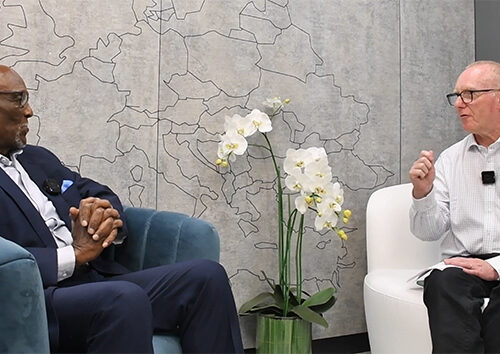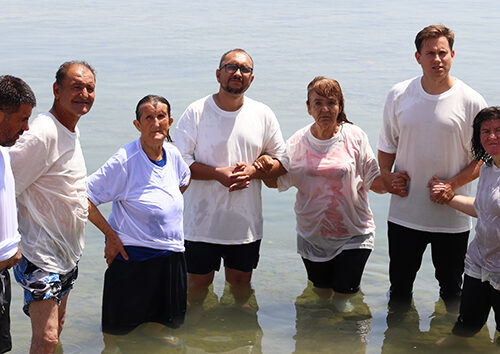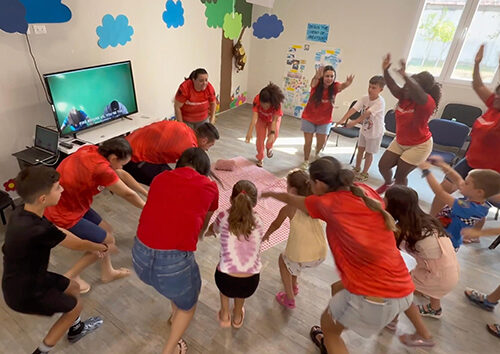11 August 2020 | St Albans, UK [Karen Holford and co.]
For centuries, graduation services have involved flowing black robes, tasselled mortarboards, processions, and diplomas. But not this year…On Sunday, May 3rd and Sunday, August 2nd, the students who had completed the Trans-European Division (TED) MA Leadership programme graduated from Andrews University in Michigan, USA. They wore whatever they wanted, and watched their online graduation from their home, their garden, and even the passenger seat of a car.
 There were still some familiar aspects of the graduation service – resounding organ music and a heart-soaring rendition of “This is our Prayer” by the Andrews University virtual choir. There was also an inspiring President’s Address by Dr. Andrea Luxton, encouraging the graduates to change the world by being just, showing mercy, and walking humbly with their God. But no marching, handshakes, or photographs. One day the graduates will receive their diplomas in the post, along with their bills, without any pomp and ceremony.
There were still some familiar aspects of the graduation service – resounding organ music and a heart-soaring rendition of “This is our Prayer” by the Andrews University virtual choir. There was also an inspiring President’s Address by Dr. Andrea Luxton, encouraging the graduates to change the world by being just, showing mercy, and walking humbly with their God. But no marching, handshakes, or photographs. One day the graduates will receive their diplomas in the post, along with their bills, without any pomp and ceremony.
 However, the most important aspect of any study programme is not the recognition and celebration of the graduation ceremony, it is the way that learning changes the lives of the students, and subsequently the community in which those students live and work. All of the MA Leadership students who graduated were required to undertake research, or complete a practical project, that would enhance their leadership skills and “change the world” in some way. Here they share some of their reflections and learning points, to inspire other leaders.
However, the most important aspect of any study programme is not the recognition and celebration of the graduation ceremony, it is the way that learning changes the lives of the students, and subsequently the community in which those students live and work. All of the MA Leadership students who graduated were required to undertake research, or complete a practical project, that would enhance their leadership skills and “change the world” in some way. Here they share some of their reflections and learning points, to inspire other leaders.
Pastor Jimmy Botha (Scotland)
When I met with my cohort for the first time in June 2016, I realised that I was going to have a tough 3 years! Time spent in the classroom and the workplace was supplemented by regular meetings with a close and supportive group of 5-6 other students, known as a Leadership Learning Group. This was where much of our energy was created.
Any leader is a leader by vocation, and leadership is not something that can just be added on to your regular working life. This was my realisation as I ministered to a small group in Scotland, and as I helped them develop the ability to lead, despite their own beliefs that they would never become leaders. The Leadership programme has helped me to be more sensitive to the needs and expectations of those I am pastoring and leading. The programme taught me better ways of finding resources, not only to improve my own skills, but also to help those I work alongside to develop their own leadership skills, whether in my Learning Group or in any other part of my life.
The Leadership Learning Group became a “laboratory” for practicing these skills, learning to wrestle with big issues, and finding helpful solutions. The past 3 years have certainly set me up to think differently about my work as pastor, a communications sponsor, and every other part of my life.
 Maja Ahac (ADRA Europe)
Maja Ahac (ADRA Europe)
When I look back at the last 3 years, I think the most important lesson I learned was that a leader leads from who she or he is. The MA Leadership reemphasised for me the crucial importance of understanding my own identity, my purpose, and my guiding values:
• The importance of identity: the more I am aware of my Father’s love toward me as His beloved daughter, the more I am able to give to others: to my family, my friends, my colleagues, and to humanity as a whole.
• The importance of purpose: I cannot lead others without having clarity about my own purpose for existence. And no, I am not here purely to serve my own selfish desires. I am here to speak and act against injustice – the root cause of suffering and pain in the world.
• The importance of my guiding values: if I am not guided by values, I cannot make proper and wise decisions. Not for myself, nor for those I lead. I live by five values that serve humanity and demonstrate God’s character. Be loving. Be wise. Have courage. Be inspirational. Be kind.
Alla Nõmmik (Estonia/Baltic Union)
The MA in leadership has helped me in many ways. When I worked in the Baltic Union it was definitely very helpful to request written feedback (one of the course requirements) from the participants of the projects that I organised. Then I could analyse the feedback, reflect on the events, and find ways to improve my leadership skills.
I wrote my project report about the CREATION Health seminar that I conducted during my studies. The self-reported results from the participants of the seminar helped me, and hopefully others who conduct such seminars, to understand the programme’s objectives better, and to discover effective ways of encouraging the participants to make healthy changes in their life-style choices.
 Karen Holford (Family Ministries Director, TED)
Karen Holford (Family Ministries Director, TED)
Like my fellow students, I learned so much from my leadership studies that have helped me in my life and my ministry. Completing my research project was especially inspiring and encouraging. I had been looking for different ways to strengthen the marriages and families in the TED. So, when I selected the topic for my research dissertation, I decided to study the effect of a short online course in marriage mentoring on the pastoral couples who took the training. The relationship of every couple who participated in the study improved in almost every area, especially communication, conflict resolution and intimacy.
This small pilot project highlighted the potential of offering online marriage mentoring training to other pastoral and lay couples, because it could enrich their relationships, as well as equipping them to help other couples. Although engaged couples are routinely offered pre-marital counselling, I wondered what would happen if every newly married couple in the TED could have a mentor couple for the first five years of their marriage, as they settle into their relationship and learn vital skills? Perhaps that will be my next project…
Pastor Dwight van Ommeren (Netherlands)
The MA Leadership helped me to deal with my feelings of helplessness when faced with conflict resolution and adversity as a leader. I can now stand firm like a tree and handle challenges, act courageously and be more assertive. The studies have helped me to become a more effective, Spirit-driven and experiential leader, able to influence others towards spiritual maturity. I now have more confidence in my administrative roles as I strive for professionalism.
My dissertation focused on how leaders make decisions about women in leadership. As I explored this issue, I discovered that decision-makers need to tread very carefully when decisions are being made about female leadership. There is a need for everyone involved to participate in the issue through active discussions and negotiation. The group must start by building strong, trusting relationships, and then create a safe place for honest and loving conversations, before any actions are taken.
Pastor Marianne Dyrud (Norway)
The Leadership programme provided me with a deeper understanding of myself as a leader, as I lead from who I am in a team. The MA gave me a sneak peek into different models and leadership styles and whetted my appetite to dig deeper into learning. I learnt that, as a spiritual leader, I first need to be connected to God and to be grounded in my relationship with Him, before I can be a credible leader in the church.
I was fascinated by the ways culture plays into leadership, as I have served in different countries. Most of all, I have learned that leadership is a place where you have to be authentic and offer your true self, so others can be safe as you lead. I have been inspired by a quote from Rachel Held Evans in her book Searching for Sunday: “Church needs to be safe, not comfortable”. May we be safe leaders, and not strive to become too comfortable, always on the lookout for when change is needed so that we can make the church a better place.
To watch the graduation ceremony, click here.
Written by: Karen Holford with Maja Ahac, Jimmy Botha, Marianne Dyrud, Alla Nõmmik, and Dwight van Ommeren.
tedNEWS Staff: Victor Hulbert, editor; Deana Stojković, associate editor
119 St Peter’s Street, St Albans, Herts, AL1 3EY, England
E-mail: [email protected]
Website: www.ted.adventist.org
tedNEWS is an information bulletin issued by the communication department of the Seventh-day Adventist Church in the Trans-European Division. Readers are free to republish or share this article with appropriate credit including an active hyperlink to the original article.



